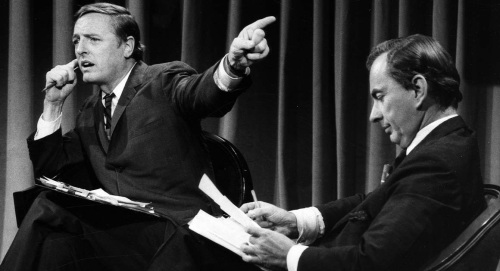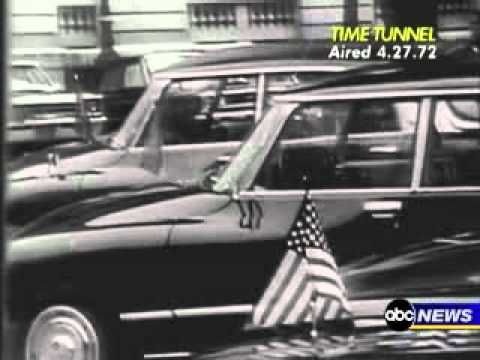
Source:Deadline Hollywood– William H. Buckley vs Gore Vidal in 1968.
Source:The New Democrat
“‘Best of Enemies’ – Pete Hammond Review”
From Deadline Hollywood

Source:POLITICO Magazine– William H. Buckley vs Gore Vidal in 1968.
What this is about is the debate between Conservative Libertarian writer and publisher of the Center-Right publication The National Review, William Buckley and Socialist, or Social Democratic writer and author Gore Vidal. They were brought on as part of ABC New’s coverage of the 1968 Republican National Convention and also went on to debate each other the Democratic National Convention that year as well.
They were brought in by ABC News to offer contrarian views of what was going on at those conventions. Bill Buckley, was supposed to represent the Right, or the Republican point of view. And Gore Vidal, was there to represent the Left, I guess the entire Left and the Democratic point of view.
Does any of this sound familiar? It should if you’re familiar with American politics today. Because that is now how its done, whether the coverage comes from the broadcast networks, or the cable news networks. You have a moderator which back then for ABC News would’ve been Howard Smith and today depending on which network you’ll have that network, or news division’s lead anchor lead their coverage of the conventions. And they would have several reporters there from their team to report what is actually happening. And then have an analyst from each side to tell people what they believe this all means. But that was not how it was done back in the late 1960s. Where you would have two people who are ideologically completely different debating what is going on.
But what happened at ABC News at the 1968 RNC was not CNN Crossfire of today. Howard Smith, was there to moderate and lead the discussion between Buckley and Vidal. But the problem is Buckley and Vidal were in separate rooms as Smith and you could barely hear, or see Smith during this debate.
If you’re familiar with Howard K. Smith, you know he wasn’t some who was short on words and opinions. He had an opinion on practically everything. From things that he was very informed about like politics, to things where he wasn’t that informed on like sports. But when you have a debate between two of the sharpest and quick-witted people at least in politics, but the media as well and perhaps in general and they don’t even respect yet like each other, it is very hard to get any word in edgewise.
So what happens in 1968 at the RNC between Bill Buckley and Gore Vidal is what we saw with Crossfire in the 1980s and 90s. Essentially a free for all without a moderator. Where the two debaters would make their points, but also listen to the other side. They would debate and moderate the same discussion at the same time. With poor Howard Smith acting not much more as a presiding officer at a U.S. Senate session, or something. Perhaps signing autographs, or catching up on paperwork. And really just serving a ceremonial role. But that debate because of the two men who were involved and what they were talking about and the year that it happened in 1968, made for great TV. And changed how politics would be covered on TV in the future.



